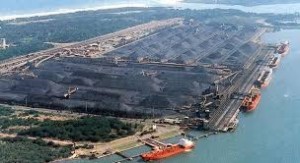By Floyd McKay, published by Crosscut
 Ambre Energy ran into no red lights on its two Columbia River coal-export projects Wednesday, but the Australia-based company remains far from receiving the green light it hopes to achieve from regulators in Washington and Oregon.
Ambre Energy ran into no red lights on its two Columbia River coal-export projects Wednesday, but the Australia-based company remains far from receiving the green light it hopes to achieve from regulators in Washington and Oregon.
The company’s coal-transfer project at Boardman on the Columbia, upriver from Portland, received three permits by the Oregon Department of Environmental Quality but the same agency told Ambre it must also apply for a different certification of water quality. Opponents of the project said that requirement could kill the project.
On the Washington side of the river at Longview, a joint statement by Cowlitz County and the state Department of Ecology announced plans to begin drafting an environmental impact statement, but warned that it would be broad in its scope and could take into consideration train and vessel traffic from other proposed projects. Ambre is partnered with Arch Coal to develop Millennium Bulk Terminals at Longview.
As with the Oregon project, Millennium opponents were buoyed by the news. The scope is similar to that earlier announced for the Gateway Pacific Terminal north of Bellingham. In all of the regional coal-export proposals, opponents have generated public reaction unprecedented in regional environmental squabbles.
The Millennium review will coincide with the EIS review of the Gateway Pacific Terminal (GPT). There may be overlap in the studies, allowing the type of cumulative regional review opponents have sought.
Both of the Washington projects’ environmental reviews are expect to take up to two years; opponents have called for a cumulative study involving all coal-export proposals (and now oil trains as well), and this may be the closest to that comprehensive review that the region will get. Coal trains bound for Longview would not transit major Puget Sound cities and ships would not enter the Sound. But both Millennium and Gateway trains would increase rail traffic in Eastern Washington and the Columbia Gorge, as would oil trains bound for the Coast.
Interested in the controversy over coal in Washington State? Come to the WCTA Breakfast debate: Should the NW Export Coal?
In Spokane, a hub for two major railways, City Council President Ben Stuckert said in a Power Past Coal news release, “Spokane has much to lose, and little to gain by allowing all these new coal trains through our town. Such an increase would harm our air quality, transportation systems, and emergency response. Today is a great step in the right direction for Spokane.”
Ambre has been pursuing coal exports from Columbia River ports for three years. The Longview project hit the rocks in 2011 when opponents turned up emails showing that the company had misled regulators on how much coal it would export. A year later, it filed applications to export 44 million tons a year, about the same volume as Gateway. The smaller project at Boardman would accept 8 million tons of coal a year, transfer it to Columbia River barges and then to Asia-bound ships at St. Helens, downriver from Portland.
The Boardman project — Morrow Pacific —was granted air- and water-quality permits and a stormwater construction permit Wednesday by the Oregon Department of Environmental Quality. But the agency also announced, “a further water quality certification — called a 401 certification — is appropriate for the project. DEQ is consulting with the U.S. Army Corps of Engineers and Ambre Energy on the next steps for this certification.” The certification covers projects that may create discharges of pollutants into any U.S. waters.